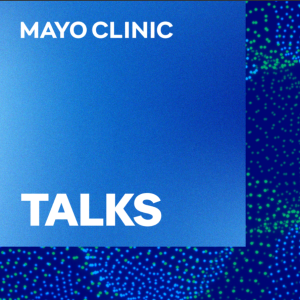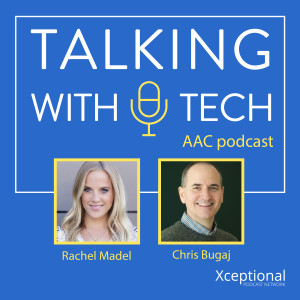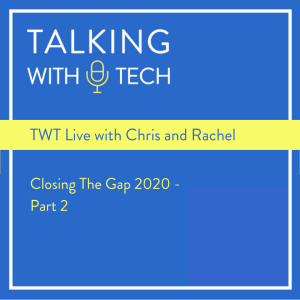This week, the TWT team presents part 2 of Talking with Tech Live: Closing the Gap! This week, Rachel and Chris discuss several topics with the audience, including personal core /key vocabulary, the importance of literacy, and overcoming barriers to high-tech AAC in school districts.
If you would like to listen to Part 1 of this presentation, you can listen at talkingwithtech.org/episodes/twt-live-ctg-1
Before Part 2, Rachel and Chris discuss PECS in greater detail, including why motor planning is so important when comparing PECS to other AAC options, the consensus among experts that Chris and Rachel trust about PECS vs. more robust AAC, and why choosing robust AAC has the least chance of harming the client.
Key ideas this week:
🔑 Without the benefit of a motor plan, using PECS to communicate can be more fatiguing than using more robust AAC. For some of Rachel’s clients, making limited progress on PECS made the family resistant to other AAC options later on.
🔑 When making a difficult decision between strategies as clinicians (e.g. PECS vs robust AAC for a client with some verbal skills), we should choose the intervention with the lowest chance of doing harm. If we assume the client will will need AAC in some form forever, the time spent teaching PECS could have been better spent learning motor plans on a robust AAC device.
🔑 If we are trying to help teachers and admins embrace robust AAC, you can point to the abuse and neglect statistics for people with disabilities. Teaching language through robust communication systems gives students a better tool to future abuse and neglect in the future.
Help us develop new content and keep the podcast going strong! Support our podcast at patreon.com/talkingwithtech!
Visit talkingwithtech.org to access previous episodes, resources, and CEU credits that you can earn for listening to TWT episodes!
More Episodes
TWT Live from New Jersey - Part 2
 2020-11-18
2020-11-18
 2.6k
2.6k
Talking with Tech LIVE from New Jersey - Part 1
 2020-11-11
2020-11-11
 2.9k
2.9k
Cuyahoga AAC Podcast Social Group: Benefits of a District-Wide AAC/AT Social Group
 2020-11-04
2020-11-04
 3.3k
3.3k
Codi & Jennifer Mendenhall: Using Social Media and Making Videos as a Teen AAC User
 2020-10-28
2020-10-28
 3.1k
3.1k
Stephen Kneece: Making Core Word & Speech Therapy Music Videos
 2020-10-22
2020-10-22
 3.1k
3.1k
Erin Sheldon & Karen Erickson: Why Literacy Matters for People with Significant Disabilities - Part II
 2020-10-15
2020-10-15
 4.2k
4.2k
Erin Sheldon & Karen Erickson: Why Literacy Matters for People with Significant Disabilities - Part I
 2020-10-07
2020-10-07
 4.9k
4.9k
Kaylie Gustafson: Supporting Eye Gaze Users Through Telepractice
 2020-09-30
2020-09-30
 3.5k
3.5k
Shawnda Saul: Telepractice AAC Coaching for Teachers, Parents, and Staff
 2020-09-23
2020-09-23
 3.2k
3.2k
Lauren Kravetz Bonnet & Brittany Thomas: Short-Term, High-Intensity AAC Intervention in the Schools
 2020-09-16
2020-09-16
 1.8k
1.8k
Alison Bono: Transitioning from Low Tech to High Tech AAC
 2020-09-09
2020-09-09
 3.8k
3.8k
Alexis Martinez & Natalie Fry: Increasing Access to AAC for Grad Students
 2020-09-02
2020-09-02
 2.7k
2.7k
Kathy Howery: Making Modeling a Better, More Meaningful Experience
 2020-08-26
2020-08-26
 3.4k
3.4k
Krista Howard & Deanna Wagner: Creating a Successful Community AAC Group
 2020-08-19
2020-08-19
 2.9k
2.9k
David Moehn: Supporting Students More Universally with Technology
 2020-08-12
2020-08-12
 3.1k
3.1k
Karen Wilson: Technology Supports for ADHD, Dyslexia, and Language-Learning Disorders
 2020-08-05
2020-08-05
 3.1k
3.1k
Teaching with Tech: Picseepal
 2020-08-03
2020-08-03
 2.4k
2.4k
Kevin Williams & Lateef McLeod: Black AAC User Perspectives on Racism and Disability
 2020-07-15
2020-07-15
 3.9k
3.9k
Erik Raj: Apps That Make Learning Language Fun
 2020-07-08
2020-07-08
 3.0k
3.0k
Chris Ellis: Improving Hearing With the Audio Cardio App
 2020-07-01
2020-07-01
 2.5k
2.5k
Create your
podcast in
minutes
- Full-featured podcast site
- Unlimited storage and bandwidth
- Comprehensive podcast stats
- Distribute to Apple Podcasts, Spotify, and more
- Make money with your podcast
It is Free
You may also like

Mayo Clinic Talks


The Saad Truth with Dr. Saad


Positive Thinking Mind


The Jordan B. Peterson Podcast


The Mel Robbins Podcast


- Privacy Policy
- Cookie Policy
- Terms of Use
- Consent Preferences
- Copyright © 2015-2024 Podbean.com




 iOS
iOS Android
Android